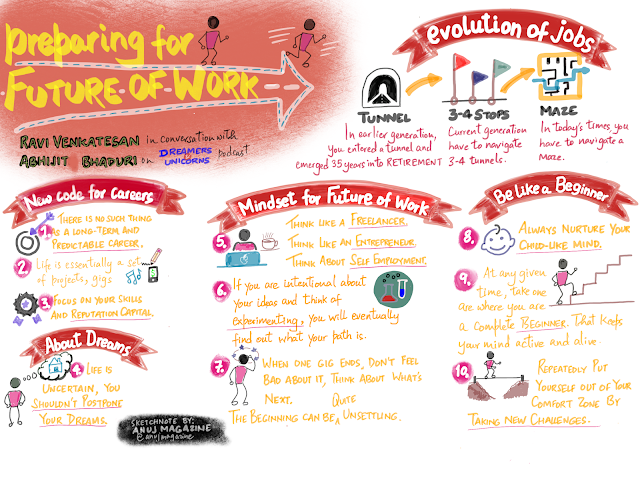Continuing my summary (from previous blog) of Abhijit Bhaduri's Dreamers and Unicorns podcast with Ravi Venkatesan.
This blog is about sharing the summary of first category- Advice to professionals.
Section Summary from the podcast:
ADVICE TO YOUNG PEOPLE
ADVICE TO MID-CAREER PROFESSIONALS:
- You need to be a learning machine. You need to be as voracious in learning about everything around you.
- Learn also about yourself .Figuring about what you are good at, what you enjoy. You can only do that by trying many things.
- Establish a reputation. You do that by being excellent. People underestimate the importance of really hard work and doing a great job. If you do it, you will get noticed and you will start attracting opportunities as your reputation spreads
- You need to be very intentional about your mindset and your attitude. It's very easy to slip into a bad attitude. Nobody starts out in life aiming to develop a sour attitude. There is victim mindset- why did this happen to me. Blame other people for your circumstances as oppose to take responsibility. A problem mindset rather than a solution mindset. All these things set in fairly early. If you are intentional about it, you can adopt a positive attitude or what you call a growth mindset these days.
ADVICE TO MID-CAREER PROFESSIONALS:
- Experiment with many things and discover for yourself.
- A very high risk of becoming obsolete. To avoid hard landing, you need to reinvent yourself.
- That's what I did every few years. It's getting boring. Let's walk away from success and start all over again. A new S curve. My life and my career are a series of S curves.
- Dealing with Obsolescence of skills:
- You have to figure out how to make yourself valuable.
- For that you have to be honest with yourself on where your real skills and aptitude lie and where your interest lie. And try to swim in that direction.
- You have to go where the joy is and where the aptitude lies.
- Navigating Organizational Politics:
- Organizations are inherently political. Political usually has this negative connotation but it is simply a factual description of multiple people who have multiple interests, agendas, value system.
- If you going to be a leader and get others to follow you and get things done, this is a skill you have to develop. And it's not a bad thing, it's not a pejorative term.
- As you grow in the organization and reach middle management, these things become more significant as you are responsible for teams, you are negotiating more things with other people to get things done. If you don't develop, you hit ceiling.
My Sketchnote Summary:
My LinkedIn post:
https://www.linkedin.com/posts/anujmagazine_success-failures-learning-activity-6631836293569572864-8BCb/
My Tweet post:
https://www.linkedin.com/posts/anujmagazine_success-failures-learning-activity-6631836293569572864-8BCb/
My Tweet post:






